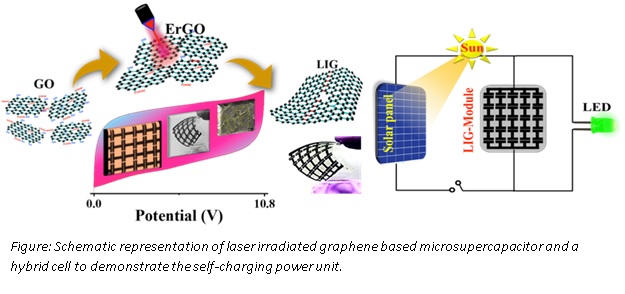Scientists at the Institute of Nano Science and Technology, Mohali, have developed a metal-free micro-supercapacitor with highly conducting and robust laser-irradiated graphene film. The supercapacitor can be readily be integrated with energy conversion technologies to provide cost-efficient and scalable energy storage solutions.
Dr. Ramendra S. Dey, scientist and his team from INST Mohali, have replaced conventional metals like Copper and Aluminium with highly conducting laser irradiated graphene (LIG) to provide an age-old solution of storage devices.
They have demonstrated that the laser irradiation process on porous graphene increases the conductivity and improves the crystallinity of the film. The use of Raman spectra proves that the laser irradiation method is capable of healing the defects with fused interconnected sheets, increasing its conductivity and crystallinity. Their results have been published in Energy Environ. Sci., 2019,12, 2507-2517, I.F ~33.25).

The scientists have exploited a simple electrochemical method followed by the laser-irradiation technique to develop metal-free energy storage devices. Several graphene-based supercapacitors have been reported earlier, but they compromise with either stability or operational voltage of the device. The laser-irradiated graphene based supercapacitor can help overcome these problems. Replacing metals will help avoid problems like corrosion and increase the lifetime of the devices. This kind of metal-free energy storage device based on laser-irradiated graphene has been reported first time to the best of the scientist’s knowledge.
As a proof-of-concept, the group connected the micro supercapacitor module with a solar cell, providing an efficient power delivery that addresses the key drawbacks of existing graphene based energy storage technologies and provides the concept of sustainable self-powered smart electronics for a proper power management strategy. Further, a ‘‘self-charging power unit’’ was demonstrated to realize the hybridization of the solar cell with the micro-supercapacitor module.
The synthetic approach, modularization, and hybridization can be scaled-up with a proper set-up and greatly influence the field of microelectronics and wearable integrated storage devices. This research provides an effective strategy to build a metal-free supercapacitor with exceptional cycle life and facilitates progress towards self-sustainable energy in the future.






























